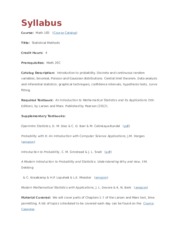Math 183 ucsd
All courses, faculty listings, and curricular and degree math 183 ucsd described herein are subject to change or deletion without notice. For course descriptions not found in the UC San Diego General Catalog —24please contact the department for more information. All prerequisites listed below may be replaced by an equivalent or higher-level course. The listings of quarters in which courses will be offered are only tentative.
Dimitris Politis Email: dpolitis ucsd. Alex Brik Email: abrik math. Walter Faig Email: wfaig math. Every Friday, a 20 minute quiz will be given. The quizes are a most important part of the class; they will focus on the examples discussed in class as well as the most recent homework that was handed-in and discussed in the last section.
Math 183 ucsd
.
Survival analysis is an important tool in many areas of math 183 ucsd including biomedicine, economics, engineering. Black-Scholes model, adaptations to dividend paying equities, currencies and coupon-paying bonds, interest rate market, foreign exchange models.
.
All courses, faculty listings, and curricular and degree requirements described herein are subject to change or deletion without notice. For course descriptions not found in the UC San Diego General Catalog —24 , please contact the department for more information. All prerequisites listed below may be replaced by an equivalent or higher-level course. The listings of quarters in which courses will be offered are only tentative. Please consult the Department of Mathematics to determine the actual course offerings each year. This multimodality course will focus on several topics of study designed to develop conceptual understanding and mathematical relevance: linear relationships; exponents and polynomials; rational expressions and equations; models of quadratic and polynomial functions and radical equations; exponential and logarithmic functions; and geometry and trigonometry.
Math 183 ucsd
All courses, faculty listings, and curricular and degree requirements described herein are subject to change or deletion without notice. The mathematics department offers a wide range of courses in pure and applied mathematics for its majors and for students in other disciplines. The department offers six majors leading to the BS: mathematics, applied mathematics, mathematics—computer science, joint major in mathematics and economics, mathematics—applied science and probability and statistics, and one leading to the BA: mathematics—secondary education. In addition, students can minor in mathematics or mathematics education. The department also has an Honors Program for exceptional students in any of the eight majors.
Abc fine wine & spirits
Network algorithms and optimization. Introduction to the theory of random graphs. Spectral estimation. Data analysis and inferential statistics: graphical techniques, confidence intervals, hypothesis tests, curve fitting. Topics may include the evolution of mathematics from the Babylonian period to the eighteenth century using original sources, a history of the foundations of mathematics and the development of modern mathematics. Offers conceptual explanation of techniques, along with opportunities to examine, implement, and practice them in real and simulated data. In recent years, topics have included formal and convergent power series, Weierstrass preparation theorem, Cartan-Ruckert theorem, analytic sets, mapping theorems, domains of holomorphy, proper holomorphic mappings, complex manifolds and modifications. Techniques for engineering sciences. Topics chosen from recursion theory, model theory, and set theory. Topics in Combinatorial Mathematics 4 Introduction to varied topics in combinatorial mathematics.
Dimitris Politis Email: dpolitis ucsd. Alex Brik Email: abrik math.
An introduction to partial differential equations focusing on equations in two variables. Multivariate time series. Prior or concurrent enrollment in MATH is highly recommended. Finite operator methods, q-analogues, Polya theory, Ramsey theory. Mathematical background for working with partial differential equations. Peano arithmetic and the incompleteness theorems, nonstandard models. Continued exploration of varieties, sheaves and schemes, divisors and linear systems, differentials, cohomology, curves, and surfaces. Third course in a rigorous three-quarter sequence on real analysis. The listings of quarters in which courses will be offered are only tentative. Analysis of Partial Differential Equations 4 A rigorous introduction to partial differential equations. Methods of reasoning and proofs: propositional logic, predicate logic, induction, recursion, and pigeonhole principle. Analysis of variance, re-randomization, and multiple comparisons.


Rather amusing phrase
What good words
In it something is. Many thanks for the information. It is very glad.